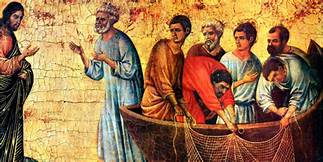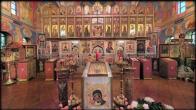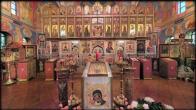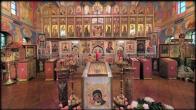You are here
The Mustering of the Apostles

Second Sunday after Pentecost / Second Sunday of Matthew, June 21, 2020
Romans 2:10-16; Matthew 4:18-23
In the Name of the Father and of the Son and of the Holy Spirit, one God.
Peter, Andrew, James and John—Jesus calls these four great apostles today in the Gospel reading from Matthew chapter 4. We will look in a moment at what this calling means in a moment, but in order to understand it, I want to recap first what happens in the previous three chapters of St. Matthew’s Gospel and also what happens in this chapter.
Chapter 1 is very familiar to us: Jesus’ genealogy is given, and He is born of the Virgin Mary.
In chapter 2, we meet the wise men from the East, St. Joseph the Betrothed takes the Lord and His mother into Egypt, the Holy Innocents are massacred by Herod, and later the Lord moves back home and lives in Nazareth.
Chapter 3 is about the preparational ministry of St. John the Forerunner and Baptist, including when he baptizes Jesus in the Jordan.
And then chapter 4, from which today’s reading is drawn, begins with Christ’s confrontation with the devil in the wilderness after forty days of prayer and fasting. This incident may not be as familiar to some of us, as it is not a Gospel read on any Sunday or feast day. I do recommend you read it on your own. In brief, though, what happens is that the devil confronts Jesus directly with three temptations, and Jesus drives him off while quoting Scripture. Then angels come and minister to Jesus at the end (Matt. 4:1-11).
The very next thing that happens is that Jesus hears that St. John the Baptist has been put into prison, and so He begins publicly preaching “repent, for the kingdom of heaven is at hand” (Matt. 4:12-17).
And then we come upon today’s passage, where Jesus begins recruiting His disciples. What do all these passages have in common with each other? They are about spiritual warfare.
Now, this might not seem immediately apparent, but let’s think about this for a moment. Beginning with Jesus’ genealogy and birth, we see the coming of the One Who is the rightful King of Kings, the Lord of creation. This world was made by Him and belongs to Him. Yet it has been subjected to domination by dark powers since the events described in Genesis. So the world is occupied territory, subject to rebellious angels, better known as demons.
Why has He come? To take back what is His. Especially mankind.
Then moving into the second chapter, we see the wise men from the East, those who previously had worshiped the stars—that is, worshiping spirits associated with creation rather than the Creator. And they turn away from that worship of the stars to worship the very Sun of Justice Himself. And yet at the same time, we see Herod, who is league with demons, demonstrating demonic oppression by massacring thousands of young boys in an attempt to kill the conquering Messiah.
The Messiah then goes to Egypt, the place from which His people were called out by the Exodus, called out from the domination of the Egyptian gods—that is, the demons the Egyptians worshiped.
When we see Him again in chapter 3, He is approaching St. John the Baptist and is baptized, an act that puts under His feet even the demonic forces in the waters, an act that is His open declaration of war on the demonic powers that enslave mankind through sin.
And then at the beginning of chapter 4, we see Him go into the wilderness to prepare Himself with prayer and fasting. So who does He meet there? The devil. And of course the devil should meet Him there to do battle with Him by tempting Him. He had come on the scene and already begun His warfare against the demons. So this was an attempt by the devil to deter Him from entering into the battle more fully.
After He defeats the devil and drives him off, He hears that St. John is in prison, which means that John’s ministry on earth is coming to a close. And He begins preaching “repent, for the Kingdom of Heaven is at hand,” the very same sermon that St. John was preaching. St. John has, in other words, passed the torch fully to the Lord Jesus.
And what does preaching the Kingdom of Heaven have to do with spiritual warfare? Well, imagine if someone were to come here and begin to proclaim that we all had to begin behaving like Canadians, because Canada was about to invade and take over Pennsylvania. Proclaiming the Kingdom of Heaven is telling the demons that their kingdom is ending. Proclaiming repentance is to tell those under the current regime what the incoming King expects of you if you are going to live under His rule.
So that brings us now to the calling of the first four disciples—Simon Peter, Andrew, James and John. Why does He call them? And what does this have to do with spiritual warfare?
With the calling of these disciples, Christ is building His army. Later in the Gospels, we will see Jesus’ disciples doing what He does in the very next passage after this one—casting out demons, calling people to repentance. And this is not only His army but also His government. The demons go out from people and places at the word of the disciples because the King gave them authority.
So how does all this connect to us here and now?
We have spent time in prayer and fasting in the wilderness. We have participated in Christ’s triumph over death. We have received the Holy Spirit so that God Himself dwells in us. And now we hear the call of Christ: “Follow Me.”
When Jesus called these four men to follow Him, they were in the process of fishing, which was their profession. So He says to them, “Follow Me, and I will make you fishers of men.” In other words, from now on, instead of catching fish, you will catch men.
From now on, instead of hauling in fish from the chaos and uncertainty of the wind and waves of the sea, you will be drawing human beings out from the chaos and uncertainty and terror and slavery of demonic oppression. You will be calling others to turn away from the kingdoms of fallen angels and to the Kingdom of Heaven.
And what happened? Those disciples became apostles, meaning they were sent. And they proclaimed this same message: “Repent, for the Kingdom of Heaven is at hand.” Look out, demons, for your rule is ending! Look out, devil, for your temptations have fallen away useless! Look out, death and hades, for your sting has been taken away!
And what do they say to us? “Repent”—that is, live as citizens of Heaven and not as citizens of death and demonic rebellion. Come out from that rebellion and be separate. Come out and join the spiritual warfare. Come out and live a life of exorcism by participating in the works of Christ.
The apostles told those to whom they were sent. And those people told someone. And then those someones told someone. And so on. And so on. Until someone told you. Until someone told me.
We come away from Pascha and Pentecost and see all the saints joining Christ to be His army and His government in reclaiming this world that is His. And we have now been given everything we need to join that same army, to participate in that same royal court of the King of Kings.
So let us also leave everything behind and go and be healers and exorcists and peacemakers and intercessors and prophets and priests and kings. This is what it means to repent. Because the Kingdom of Heaven is indeed at hand.
To the King coming in His Kingdom, Jesus Christ, therefore be all glory, honor and worship, with His Father and the Holy Spirit, now and ever, and unto ages of ages. Amen.
· Fr. Andrew Stephen Damick
PARISH LIFE
RECENT VIDEOS
Address of our Cathedral
Subscribe to our mailing list
While all the materials on this site are copyrighted, you may use them freely as long as you treat them
with respect and provide attribution on the Russian Orthodox Cathedral of St.John the Baptist of Washington DC.









